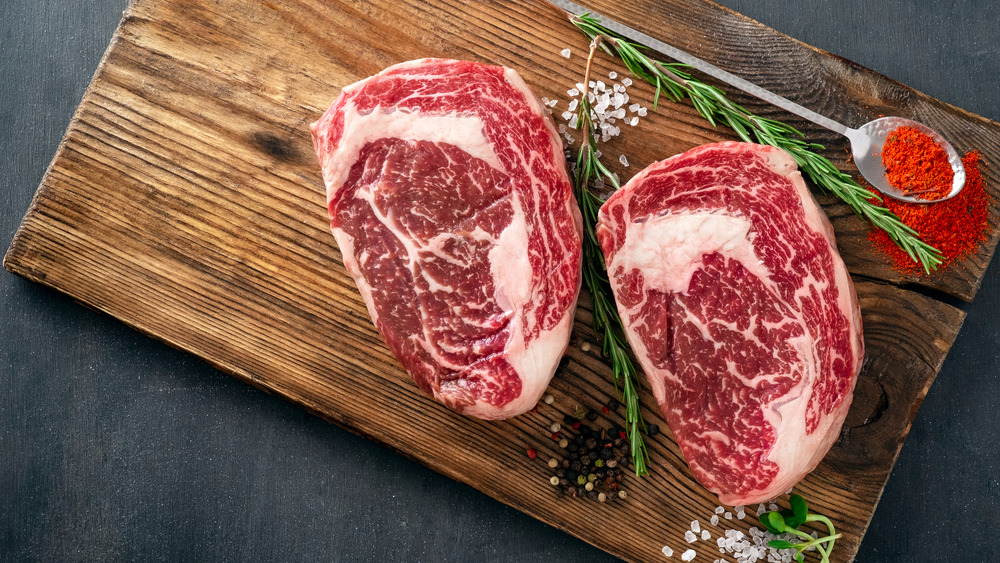When You Stop Eating Red Meat, This Is What Happens To Your Body
Although red meat was not a part of our early ancestors' diet, the human body has since evolved to be able to digest and metabolize red meat. Still, it's unknown whether our bodies have evolved enough to handle the amount of red meat we now eat or the processing that goes into it. As Healthline explained, there's no question red meat offers essential nutrients, but a great deal of scientific evidence suggests our current red meat consumption may harm us, even shortening our lives.
On the other side of the coin, a 2019 study published in the journal Annals of Internal Medicine concluded red meat poses "no harm," and even went so far as to recommend that adults continue consuming it at their current level. That being said, this study has caused considerable controversy, with respected members of the scientific community going on record to point out its inherent bias and other serious flaws (via Scientific American). Ultimately, the study was amended with the caveat that its results were "low certainty" and its recommendations "weak."
Nevertheless, scientists continue debating the subject. Still, you might notice you feel better — or worse — after giving up red meat. Let's take a look at just what happens when you give up the red stuff.
You could definitely lose a few pounds if you stop eating red meat
Putting aside the questions raised by the 2019 study published in the journal Annals of Internal Medicine, which suggested red meat doesn't raise the risk of mortality from all causes, one thing became clear from our discussions with experienced nutrition experts. Registered dietitian Trista Best told Health Digest, "Red meat is scientifically associated with a higher risk of obesity." What isn't known is whether eating red meat causes obesity, or if it's coincidence that people with obesity tend to eat more red meat. However, the fact remains that people who stop eating red meat do tend to lose weight, according to Best.
Best's observation is supported by the results of a 2020 study published in the Journal of the American Medical Association, which demonstrated that overweight people who stopped eating animal protein lost significant weight (14 pounds) in a short period of time (16 weeks). Such profound results could be game-changing, Hana Kahleova, lead study author and director of clinical research at the Physicians Committee for Responsible Medicine, informed Health Digest.
Cutting out red meat paves the way for more plant-based protein
One benefit of cutting out red meat may be that you make room for eating more phytonutrients, according to registered dietitian Trista Best. "Phytonutrients are plant-based compounds that aren't vital for sustaining life but nevertheless beneficial to the human body." she told Health Digest.
Among other things, phytonutrients act as antioxidants, meaning they protect cells from damage by "free radicals" produced when the body metabolizes nutrients (via Mayo Clinic). Elimination of free radicals can help decrease chronic inflammation, which is, itself, associated with health problems such as cancer, heart disease, and diabetes, according to Medical News Today.
When red meat ceases to be source of protein, you are left to find other sources to replace it. While you may swap in poultry and fish, there is also an opportunity to integrate more plant-based protein sources into your diet, according to Harvard Health Blog. Since red meat happens to be high in calories relative to other protein sources, you'll not only have the opportunity to introduce phytonutrient-rich plant-based proteins, but also to enjoy a higher volume without increasing your calorie intake.
Excluding red meat from your diet can help reduce dangerous chronic inflammation in your body
Chronic inflammation is associated with many serious and sometimes life-threatening conditions, according to Healthline. For example, chronic inflammation is indirectly linked to the development of type 2 diabetes and cardiovascular disease. It's also linked directly to obesity (via Endocrineweb). Inflammation also plays a role in the development of Alzheimer's disease and certain cancers, among other conditions, a 2017 study explained.
Inflammation isn't inherently bad. "Inflammation is the body's natural protective response to a variety of stressors," according to registered dietitian Whitney English Tabaie. "It's job is to control and resolve tissue damage." However, chronic inflammation is a different story. And the foods we consume may create stress that initiates the inflammatory process. That process includes the manufacture of certain compounds that are known as inflammatory markers, a 2014 study published in The BMJ explained.
Scientists measure levels of these markers in our blood to detect certain diseases, disease processes, and risks thereof. Studies have found that people who substitute whole grains for red meat have lower inflammatory markers. In other words, when you stop eating red meat, you eliminate a source of chronic inflammation.
Your gut microbiome will thank you for removing red meat from your diet
"When you eat a lot of red meat, certain gut bacteria are activated to digest the nutrients the meat contains," according to registered dietitian and health coach Cassie Christopher. While that may sound normal and healthy, it also raises a problem, which is that one of the byproducts of gut bacteria's digestion of red meat is a compound known as trimethylamine N-oxide (TMAO), a study published in Toxins explained. Higher levels of TMAO circulating throughout the body have been associated with a higher risk of heart disease, according to Harvard Women's Health Watch.
Conversely, a 2019 study published in the European Heart Journal found study demonstrated that in people who discontinued red meat in favor of white meat or no meat at all, TMAO levels decreased significantly. "This study shows for the first time what a dramatic effect changing your diet has on levels of TMAO," Dr. Stanley L. Hazen of the Cleveland Clinic told the National Institutes of Health.
Giving up red meat is a great opportunity to reduce your consumption of saturated fat
The American Heart Association recommends aiming for a dietary pattern that achieves no more than 5 to 6 percent of calories from saturated fat (via Verywell Health). Registered dietitian Trista Best explained to Health Digest that saturated fat is one of two primary forms of fat, the other being unsaturated.
Saturated fat lacks a double bond between the individual carbon atoms that connect the fatty acids. As a result, saturated fat become solid at room temperature. And, in turn, saturated fat is associated with the buildup of a substance known as "plaque," which is made of cholesterol, calcium, and other substances found in the blood (via Medicine Net). Over time, plaque limits the flow of oxygen-rich blood to your organs and other parts of your body (a condition known clinically as atherosclerosis), according to Healthline.
Saturated fats mainly come from animal sources, including red meat, which is higher in saturated fat than other forms of protein, per the American Heart Association (via Verywell Health). Replacing red meat with other forms of protein can decrease your consumption of saturated fat, which can help stave off atherosclerosis and generally contribute to a healthier circulatory system, according to Best.
If you want to reduce your risk of heart disease, cutting out red meat is a good start
Since red meat is associated with many of the conditions that increase your risk of heart disease (e.g., body weight, inflammation, plaque, and cholesterol, among others), it shouldn't be surprising that cutting out red meat can lower your risk of heart disease, according to a 2020 study published in the British Medical Association's British Medical Journal.
An increase in body fat alone is enough to put a strain on your heart, according to Johns Hopkins Medicine's Health, which characterized obesity as an effective "solo player" when it comes to causing heart injury, and people who eliminate red meats from their diet tend to lose weight in the process, according to registered dietitian Trista Best.
In fact, a 2020 study published in the Journal of the American Medical Association demonstrated that overweight people who stopped eating animal protein lost significant weight in a short amount of time, and that could be an important step in improving heart health.
When you stop eating red meat, your reduce your risk of stroke
Chronic red meat consumption significantly increases stroke risk, according to registered dietitian Trista Best. A stroke happens when the blood supply to the brain is interrupted via rupture or blockage, resulting in the rapid death of brain cells, which require blood and oxygen to live (via Healthline). About 87 percent of all strokes are the type known as ischemic, according to the CDC.
Ischemic strokes are caused specifically by narrowing or a blockage in the blood supply to the brain, Healthline explained. Such blockages may be caused by blood clots, but are more frequently caused by the buildup of plaque in the arteries (clinically known as atherosclerosis). Pieces of plaque have been known to break off, and this can set off a stroke.
Since saturated fat is linked to an increase in arterial plaque buildup, and red meat contains more saturated fat than virtually any other protein source, it's shouldn't be particularly surprising that people who consume less red meat overall are less likely to have a stroke, Best told Health Digest.
When you forgo eating red meat, you may lower your risk of type 2 diabetes
When you stop eating red meat, you may be reducing your risk of developing type 2 diabetes, physician Leann Poston told Health Digest. Due to the saturated fat in red meat, it may increase insulin resistance, which has the effect of making blood sugar rise to unhealthy levels (via WebMD). According to the Centers for Disease Control and Prevention, insulin resistance is a key player in the development of this form of type 2 diabetes. Red meat consumption also increases your risk of non-alcoholic fatty liver disease, which is also linked to type 2 diabetes, studies show.
Dr. Poston's view is supported by a 2018 study published in the Journal of Hepatology, which showed that a daily weekly consumption of more than two 3.5-ounce servings of red or processed meats is associated with both insulin resistance and non-alcoholic fatty liver disease. Therefore, by eating less or no red meat, you are eliminating two very important factors that may contribute to the development of type 2 diabetes.
You may be able to prevent kidney disease when you stop eating red meat
Scientists have known that large amounts of protein is linked to poorer kidney health, as a 2016 study explained, but the research had been broad in that it included many sources of protein (not just red meat) and narrow in that only included people with existing kidney disease. But a large 2016 study out of Singapore that was published in the Journal of the American Society of Nephrology made clear that even in people with healthy kidneys, consuming red meat boosts the risk of kidney failure. Replacing even one daily serving of red meat for some other kind of protein can help decrease that risk.
One reason is that red meat consumption is associated with poorer blood circulation, which can contribute to poor kidney health (via Harvard Heart Letter). Another reason is that red meat consumption is associated with insulin resistance, which can increase risk of type 2 diabetes and, in turn, contribute to poor kidney health.
Removing red meat from your diet may reduce your risk of colon cancer
In the U.S., colon cancer is one of the most common cancers and the second leading cause of cancer death (via Cancer.net). But it's possible to decrease your risk by reducing or eliminating your consumption of red meat, according to two 2005 studies cited by Harvard Men's Health Watch.
The first tracked nearly 500,000 European adults who did not have colon cancer at the beginning of the study. During five years of follow-up, those who ate 5 ounces per day or more of red meat were a third more likely to receive a colon cancer diagnosis. The consumption of chicken had no effect at all, while the consumption of fish tended to reduce colon cancer risk by about a third.
The second study tracked about 150,000 Americans between the ages of 50 and 74. Each person self-reported their dietary patterns and health habits, and over a period of 10 to 11 years, higher consumption of red meat was linked to greater likelihood of being diagnosed with colon cancer. By contrast, greater consumption of fish and poultry appeared to help keep that risk low.
If you stop eating red meat, you could decrease your risk of certain breast cancers
There are many kinds of breast cancer, and they differ broadly, including in terms of their biological makeup and their tendency to grow as a result of exposure to hormones such as estrogen and progesterone, according to the American Cancer Society. They can also differ in how they present, depending on whether or not a woman has reached menopause. Although it has long been suspected that red meat consumption may affect the likelihood of developing breast cancer, there was little research on the effects of red meat consumption on particular subsets of breast cancers until 2013.
That was when a landmark study published in the Archives of Internal Medicine used existing long-term data of about 91,000 women and concluded that women between the ages of 26 through 46 who ate more red meat were more likely to develop hormone-positive breast cancer prior to menopause. Those who ate more poultry during the same period had a lower risk of developing breast cancer.
Removing red meat from your diet could support a healthier brain as you age
Eating red meat can be good for the brain by providing high-quality protein and other essential nutrients. However, consuming red meat may be a risk factor for developing dementia over time. This is because consumption of red meat is associated with the development of atherosclerosis, which is when fatty deposits in your blood narrow or harden arteries, leading to diminished blood circulation, a 2012 study revealed. As it turns out, this not only increases your risk of stroke but is also an important risk factor for dementia, according to various scientific studies, including a 2011 study published in Annals of Neurology and a 2018 study published in the journal Nutrients.
Another reason is that red meat is high in iron. While iron is one of those essential nutrients for which red meat is known, it can build up over time in the brain, and that may, in time, impair normal cognitive function and behavior, according to a 2018 study published in Frontiers of Neuroscience.
Quitting red meat won't necessarily help you if you don't replace it wisely
While decreasing or eliminating your consumption of red meat can have a number of positive effects on your health, it is important to consider that all of these effects presume that you will replace the red meat you've been consuming with foods that contribute to better health, including poultry, fish, nuts, beans, and plant-based foods containing phytonutrients. If you fail to replace red meat with healthy, alternate sources of protein, then you may be cheating your body out of this important macronutrient (via Healthline).
Other nutrients that may go missing from a red-meat restricted diet in include calcium, iron, and vitamin B12, according to Harvard Women's Health Watch. While you may find alternate sources in eggs and dairy, if for whatever reason you don't eat eggs or dairy, you may need to consider supplementation. Also, if in place of red meat, you're eating highly processed foods or other foods that have less favorable health profiles than red meat, you will not be doing your body any favors by eliminating red meat, according to physician Leann Poston.
If you stop eating red meat, you may increase your chances of living longer
If you give up red meat, you may just give yourself a better chance of living longer. In a landmark study from 2012, researchers followed the health and health habits of 37,000 men and 83,000 women for several decades. Based on the data gathered, the researchers were able to conclude that a single additional serving of red meat daily increased the risk of death in the people they followed by 13 percent. When the red meat was also processed, the mortality risk went up to 20 percent.
"We estimated that substitutions of 1 serving per day of other foods (including fish, poultry, nuts, legumes, low-fat dairy, and whole grains) for 1 serving per day of red meat were associated with a 7% to 19% lower mortality risk," the researchers noted.
"This study provides clear evidence that regular consumption of red meat, especially processed meat, contributes substantially to premature death," Dr. Frank Hu, one of the senior scientists involved in the study and a professor of nutrition at the Harvard School of Public Health, told Harvard Men's Health Watch.















